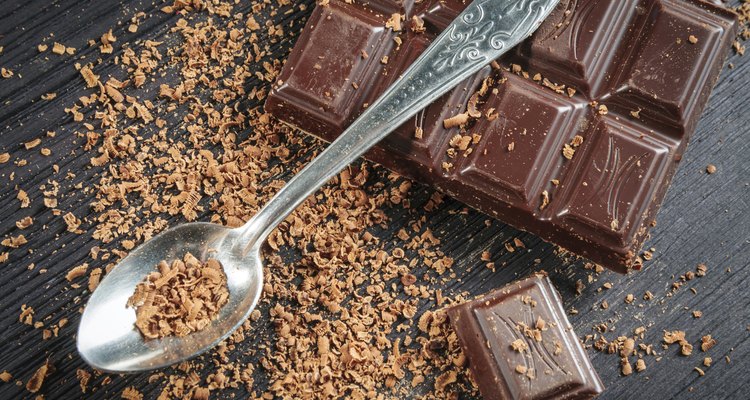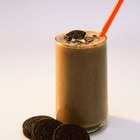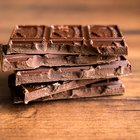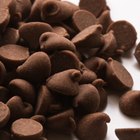
dziewul/iStock/Getty Images
It's often tempting to reach for a chocolate bar when you're searching for a boost of energy, as this snack provides a sweet treat that temporarily satisfies. Don't make chocolate a habit, however, because regularly enjoying this product can lead to a multitude of health issues. Dark chocolate, which has many potential benefits, is a healthier choice than milk or white chocolate.
Potential for Weight Gain
The high calories in chocolate can increase your risk of gaining weight. Weight gain results when your caloric intake exceeds your caloric expenditure, and high-calorie foods such as chocolate can lead to the former being greater than the latter. Standard-sized candy bars typically have between 200 and 250 calories. If your suggested caloric intake is only 2,000 calories per day, for example, one candy bar can provide more than 10 percent of that total.
Risk of Diabetes
Eating chocolate boosts your sugar intake; candy bars can routinely contain between 20 and 40 grams of sugar. A diet high in sugar can increase your risk of developing Type 2 diabetes. This type of diabetes is especially prevalent among those who are overweight or obese. A study by researchers from three California universities, published in the February 2013 issue of "PLOS ONE" journal, found that a population's sugar consumption has a direct link with its rate of people with diabetes.
Link With Acne
If your parents told you to avoid chocolate because of its link with acne, they weren't exactly correct. Although eating chocolate doesn't directly result in acne, this skin condition can often result from your diet. A diet high in dairy products and carbohydrates might increase your risk of acne. Many candy bars and chocolate products contain milk, and candy bars are a significant source of carbs.
Caffeine Side Effects
Chocolate is a source of caffeine, and while chocolate doesn't have as much of this stimulant as a cup of coffee, it can still lead to health-related side effects. Caffeine often leads to a jittery feeling and might give you anxiety and restlessness and disrupt your sleep. Because it's possible to develop a dependency on caffeine, if you normally eat a lot of chocolate, eliminating it from your diet may lead to withdrawal side effects such as headaches and mood changes.
Types of Chocolate
When it comes to chocolate, having a higher cocoa content is better. Cocoa contains flavonoids -- which are antioxidants with beneficial functions such as helping to repair cells -- along with minerals such as calcium and potassium. Flavonoids can also help lower your cholesterol and blood pressure. White chocolate contains no cocoa at all, and is high is fat and sugar, so has no health benefits. Dark chocolate contains more cocoa than milk chocolate. Carefully inspect the label of chocolate products and opt for those that contain at least 65 percent cocoa. A 1-ounce serving of dark chocolate per day can be part of a healthy, balanced diet.
Related Articles

Chocolate and Vitamins

How Does Chocolate Affect the Nervous ...

Skin Benefits of Eating Coconut Oil

Caffeine in Chocolate Versus Coffee

Strawberries & Acne

How to Remove Chocolate Stains From ...

Chocolate Milk and Weight Loss
How Many Calories are in Pistachio ...

The Carbohydrates in Chocolate

Stimulants in Chocolate That Are not ...

FDA Standards of Chocolate Identity

How Many Types of Chocolate Are There?

What Is Agave Syrup?

Which Country Produces the Most ...

What Vitamin Are You Missing If You ...
Snacks Compatible With a Diet for Gout

A List of Foods That Contain Choline
Can Adults Drink Whole Milk?

The Amount of Lactose in Yogurt

Dairy Substitutes for Quiche
References
- Centers for Disease Control and Prevention: Balancing Calories
- CNN: Nutrition Comparison of Candy Bars
- Center for Nutrition Policy and Promotion: Balancing Calories to Manage Weight
- National Heart, Lung, and Blood Institute: What Are the Health Risks of Overweight and Obesity?
- PLOS One: The Relationship of Sugar to Population-Level Diabetes Prevalence: An Econometric Analysis of Repeated Cross-Sectional Data
- MayoClinic.org: Acne Causes
- MedlinePlus: Caffeine in the Diet
- Fitness: Food Fight: Milk Chocolate vs. Dark Chocolate
Writer Bio
Toronto-based journalist William McCoy has been writing since 1997, specializing in topics such as sports, nutrition and health. He serves as the Studio's sports and recreation section expert. McCoy is a journalism graduate of Ryerson University.
Photo Credits
dziewul/iStock/Getty Images